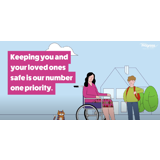As your landlord, fire safety is a top priority and we work very hard to ensure that our homes are as safe as possible.
Below, you can find fire safety advice and tips to help you prevent fires and what to do in the event of a fire.
Your local fire and rescue service can provide a free fire safety check on your home. For more information about this in the Lancashire area, visit Home Fire Safety Check | Lancashire Fire and Rescue Service (lancsfirerescue.org.uk)
If you live outside Lancashire, please check your local fire service website for local fire safety advice and information on home checks.
The most likely place for a fire to start is in the kitchen.
• When you are cooking, make sure that you do not leave the kitchen
• Make sure that towels are away from open flames and the cooker
• Keep your oven, grill, air fryers, microwaves and toasters clean, as fat and bits of food can catch fire
• Keep flammable items, such as paper, flammable liquids and gases, away from toasters, microwaves, grills, and the grill element of the air fryer
• Never use tin foil in a microwave or air fryer
• Check you have turned everything off when you have finished cooking
• Make sure the area around your appliances (toaster, air fryer, microwave) are clear and not under any over the counter cupboards or curtains
• We recommend you do not use a chip pan as they are very dangerous and are a major cause of incidents.
• Only use washing machines, tumble dryers and dishwashers when you are at home and not asleep
We carry out electrical checks on a regular cycle to ensure the safety of your installation.
- If a wire or plug looks damaged, then do not use it
- If there are scorch marks around a plug on the wall, do not plug anything into it
- Do not plug more than one thing into each socket
- Switch off and unplug things when you are not using them
- Make sure that wires are not tangled. When a wire is twisted, and electricity is running through it, the wire can get extremely hot and start a fire.
- When you are not in the room, make sure you turn off your fire or electric heater
- Do not leave your fire or electric heater on overnight
- Do not leave anything close to a fire or heater
- If you have a portable electric heater, then make sure you do not position it right next to a wall or piece of furniture
- If you use an electric blanket, then make sure you switch it off before you go to bed.
If you have a barbecue, please be mindful of the risks.
Never use a barbecue – including disposables – indoors or on your balcony.
As well as the fire risk, and risk of burns, the carbon monoxide fumes can be lethal.
If you use a barbecue in your garden, make sure your barbecue site is flat and away from fences, trees and sheds.
Keep a bucket of water or a garden hose nearby, in case of emergency.
Always supervise children and pets when they are around barbecues and chimineas.
Never use petrol or paraffin to start or revive your fires; use only recognised lighters or starter fuel, on cold coals.
Coals can stay hot for over 24 hours. Never put hot coals in your rubbish bin. Leave to cool completely before disposal.
- We recommend that you do not use candles or smoke inside.
- Do not use BBQs on balconies or in enclosed spaces.
- To prevent fires from electric irons, always unplug them after each use, allow them to cool down completely on a heat-resistant surface, and store them safely to prevent accidental activation.
- Regularly inspect the cord and plug for damage, and never leave a hot iron unattended. Keep flammable materials away.
- Do not charge items with lithium batteries, such as mobile phones, laptops, e-scooters and e-bikes, overnight or while you are out of the house.
Tumble dryers, washing machines and dishwashers are a common fire hazard if left running unattended. We advise that you don’t put these on overnight as they can set on fire.
We also recommend that you keep your appliances clean and regularly maintain and service them. Clean the dryer filters after every use and check the draw at the top or base of your condenser dryer.
Never overload your washer or dryer
Never ignore any burning smells or tripped circuits
If the appliance or clothes feel hotter than normal, or the clothes are taking longer than normal to dry, and you have checked the vents are clear, call an engineer to check the appliance.
Responsibilities for fire and gas safety in your home
Who is responsible for fire safety?
We are all responsible for checking and improving fire safety in our homes. As your landlord, we make a promise to you to keep you safe.
What are tenants responsible for?
As a tenant, you must make sure that you don’t create a fire hazard in your home.
For example, please:
- don’t store flammable items on your balcony
- don’t block fire escape routes
- turn off electric heaters when you go out
- avoid using candles
- don’t leave the kitchen when you are cooking
- don’t charge items with lithium batteries overnight, such as laptops, phones or e-scooters as these can overheat and catch fire
- make sure cigarettes are fully extinguished before discarding them in the bin. Never smoke in bed
- keep all escape routes clear and make sure keys to your home are always easy to access
You should test your smoke alarm in your home each month and replace the batteries if they do not work. Please let us know if you cannot change the batteries yourself.
What are landlords responsible for?
As your landlord, we promise to:
- provide smoke alarms on each floor of your home
- check the alarms are working when your tenancy begins
- repair or replace faulty smoke alarms
- install a carbon monoxide alarm if there is a gas appliance in habitable rooms (bedrooms/living rooms) of the property, or a solid fuel burner
- make sure that front doors of flats and communal areas (like corridors and staircases) have self-closing fire doors installed
We have a legal duty to make sure that a fire risk assessment is carried out and remove any fire risks and hazards, or to reduce these as far as possible.
We will make sure that fire exits and escape routes in buildings are not blocked, and that everyone in the building knows the evacuation plan in case there is a fire.
In the event of a fire, get out and stay out
- If a fire alarm goes off or you see or smell a fire, then you should get out safely as soon as possible
- Remember to stay calm and not panic
- Do not try to put the fire out, and do not grab any of your belongings on your way out
- If there is smoke then get down on your hands and knees where the air is clearer
- Once you are outside, get a safe distance from the house and ring 999.
If you can't get out:
- If a fire blocks your normal exit route from a building then try to find another way out
- Use the stairs and not a lift
- If there is no way out using a door then if you are on the ground or first floor then you can try escaping through a window
- If you can you should drop something soft out of the window to land on like pillows or a duvet
- If you cannot get out through a door or window then you should find a room without any smoke in it and close the door
- Stay as low as possible to avoid the smoke
- Put something like a towel or clothes behind the door to stop any smoke coming through the gap under the door
- If you have a mobile phone then ring 999
- Try to let people know you are there by shouting
- If your clothes catch fire remember to stop, drop and roll.
- Your local fire and rescue service can provide a free fire safety check on your home. For more information about this in the Lancashire area, visit Home Fire Safety Check | Lancashire Fire and Rescue Service (lancsfirerescue.org.uk)
If you live outside Lancashire, please check your local fire service website for local fire safety advice and information on home checks.

Can't find what you're looking for?
Get help from our friendly Customer Contact Team.
